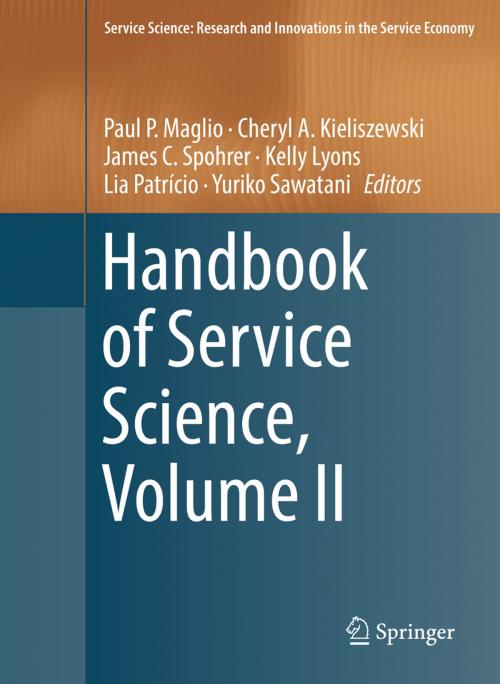Handbook of Service Science, Volume II
Business & Finance, Management & Leadership, Operations Research, Industries & Professions, Information Management| Author: | ISBN: | 9783319985121 | |
| Publisher: | Springer International Publishing | Publication: | October 16, 2018 |
| Imprint: | Springer | Language: | English |
| Author: | |
| ISBN: | 9783319985121 |
| Publisher: | Springer International Publishing |
| Publication: | October 16, 2018 |
| Imprint: | Springer |
| Language: | English |
The second volume of this successful handbook represents varied perspectives on the fast-expanding field of Service Science. The novel work collected in these chapters is drawn from both new researchers who have grown-up with Service Science, as well as established researchers who are adapting their frames for the modern service context.
The first Handbook of Service Science marked the emergence of Service Science when disciplinary studies of business-to-customer service systems intertwined to meet the needs of a new era of business-to-business and global service ecosystems. Today, the evolving discipline of Service Science involves advanced technologies, such as smartphones, cloud, social platforms, big data analytics, and artificial intelligence. These technologies are reshaping the service landscape, transforming both business models and public policy, ranging from retail and hospitality to transportation and communications. By looking through the eyes of today’s new Service Scientists, it is anticipated that value and grand challenges will emerge from the integration of theories, methods, and techniques brought together in the first volume, but which are now rooted more deeply in service-dominant logic and systems thinking in this second volume.
The handbook is divided into four parts: 1) Service Experience--On the Human-centered Nature of Service; 2) Service Systems–On the Nature of Service Interactions; 3) Service Ecosystems–On the Broad Context of Service; 4) Challenges–On Rethinking the Theory and Foundations of Service Science. The chapters add clarity on how to identify, enable, and measure service, thus allowing for new ideas and connections made to physics, design, computer science, and data science and analytics for advancing service innovation and the welfare of society.
Handbook of Service Science, Volume II offers a thorough reference suitable for a wide-reaching audience including researchers, practitioners, managers, and students who aspire to learn about or to create a deeper scientific foundation for service design and engineering, service experience and marketing, and service management and innovation.
The second volume of this successful handbook represents varied perspectives on the fast-expanding field of Service Science. The novel work collected in these chapters is drawn from both new researchers who have grown-up with Service Science, as well as established researchers who are adapting their frames for the modern service context.
The first Handbook of Service Science marked the emergence of Service Science when disciplinary studies of business-to-customer service systems intertwined to meet the needs of a new era of business-to-business and global service ecosystems. Today, the evolving discipline of Service Science involves advanced technologies, such as smartphones, cloud, social platforms, big data analytics, and artificial intelligence. These technologies are reshaping the service landscape, transforming both business models and public policy, ranging from retail and hospitality to transportation and communications. By looking through the eyes of today’s new Service Scientists, it is anticipated that value and grand challenges will emerge from the integration of theories, methods, and techniques brought together in the first volume, but which are now rooted more deeply in service-dominant logic and systems thinking in this second volume.
The handbook is divided into four parts: 1) Service Experience--On the Human-centered Nature of Service; 2) Service Systems–On the Nature of Service Interactions; 3) Service Ecosystems–On the Broad Context of Service; 4) Challenges–On Rethinking the Theory and Foundations of Service Science. The chapters add clarity on how to identify, enable, and measure service, thus allowing for new ideas and connections made to physics, design, computer science, and data science and analytics for advancing service innovation and the welfare of society.
Handbook of Service Science, Volume II offers a thorough reference suitable for a wide-reaching audience including researchers, practitioners, managers, and students who aspire to learn about or to create a deeper scientific foundation for service design and engineering, service experience and marketing, and service management and innovation.















